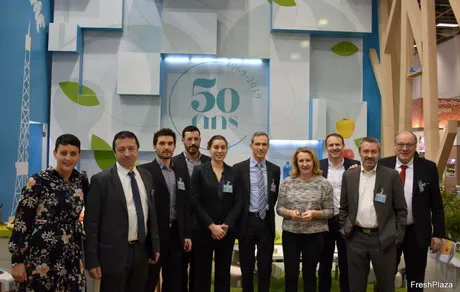Marc Peyres, commercial and export marketing director at Blue Whale, is clear on the difference between “selling” and “shipping”. “Selling means finding prices that are fair to the producers. Shipping simply means getting rid of the merchandise. When we send apples to Egypt, India or China at very low prices, this is shipping, not selling. In some countries at the moment, when stocks are very important, the operators are forced to ship at very low prices.”
With the intention to sell, and not to ship, France restructured its orchards 15 years ago. “We reduced the production and changed varieties. A huge effort was made by our producers. Today, we focus on quality. France produces very differently than other European countries. Globally, markets are low at the moment, but the variety and quality aspects do play an important role. We do not sell our apples at extremely low prices like the Polish apples, for example.”
A peculiar season for Blue Whale
This year, Blue Whale had a small harvest, with fewer fruits, especially in the southwest. “We have fewer volumes than last year. Many other European countries, on the other hand, had a big harvest this year.”
Last year, the apple harvest in Europe was very low. “At the end of the season, the market was empty and prices were high, with a strong demand at the start of this season. We seized the opportunity to sell a large proportion of our apples at the beginning of the season. The high temperatures from the summer also influenced our decision. In fact, we did not trust that certain summer varieties like the Royal Gala would keep well. Generally speaking, this season is disappointing because we are lacking volumes in this European context of overproduction. But in terms of prices, this season was better than anticipated.”
Blue Whale has almost finished its stocks of Gala, Granny Smith and red varieties. “All we have left are the true French varieties which sell pretty well, like the Chantecler and Canada Gris. We also have some Pink Lady and Joya left. The Pink Lady is selling very well for now, with a nice quality. The Joya arrived on the market 2 weeks ago. We are now observing an acceleration of the sales, even better than in previous years.” Blue Whale sells its Fuji at a higher price than last year. “The demand is good for the nice Fuji. The harvest is 30% lower than a normal year, which partly explains this!”
“On the European market in general, sales are very complicated and quite slow,” explains Marc. “We sell less on the European market, whether it is in the north or in the south. But since we have fewer apples to sell, we are not significantly affected by this dramatic situation. If we had a large stock today, we would be extremely worried.”
 The Blue Whale team at Fruit Logistica
The Blue Whale team at Fruit Logistica
The miracle variety
There are now many varieties, old and new. “Everybody thinks they have the miracle variety, but in reality, it is the consumers that sort through the varieties, especially based on taste, for which they are willing to pay. Not all varieties announced present an interest compared to the ones we currently have.”
Favorable conditions on the Chinese market
Blue Whale sells a small part of its volumes in China. “Taxes on American apples facilitated the export to China, as well as the Chinese harvest which was 30% inferior to a normal year. This year, we also benefited from the fact that local prices were higher. But for us, China remains a niche market, which does not contribute much to the final outcome, contrary to what one might think.”
The Asian taste
“Polish apples are sold at such low prices on the Asian market that it is not economically viable,” claims Marc. “There is no rentability, no interest. Today in Europe, we do not produce varieties which can enable us to develop a market in Asia. Most of the apples produced in Europe are not adapted to the Asian taste. We will only be able to sell more in Asia when we will have developed new varieties adapted to this market, but they are not necessarily the ones that are popular in Europe, hence the difficulty. With the varieties we have today essentially in Europe, our export potential to Asia is very limited in terms of the development of volumes at decent prices.”
For more information: 
Marc Peyres
Blue Whale
1205 Avenue de Falguières
82004 Montauban Cedex
Phone: +33 (0)5 63 21 56 56
marc@blue-whale.com
www.blue-whale.com
